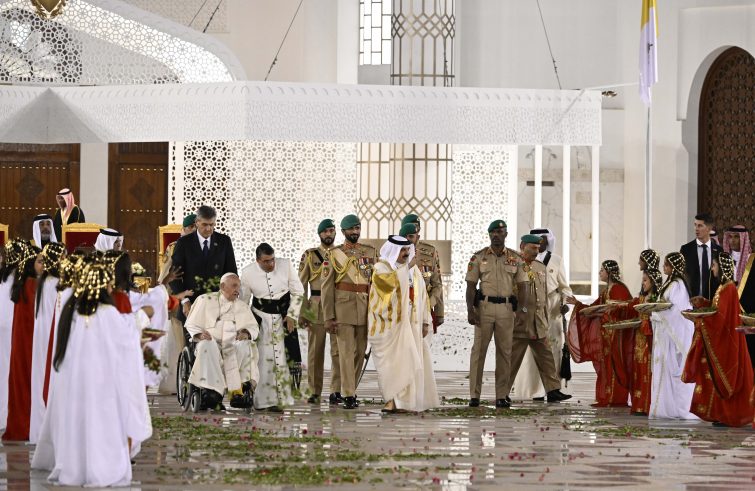
In his first speech in the Kingdom-Archipelago situated midway between the Qatar peninsula and Saudi Arabia, Pope Francis – the first pontiff to visit Bahrain and to travel to the Arabian Peninsula for the second time in three years – called for peace and fraternity in a world that has been bloodstained by a “monstrous and senseless” war. Speaking to authorities, civil society and the diplomatic corps in Awali, Pope Francis referred to Bahrain as “a crossroads of mutual enrichment between peoples.” The spotlight is on the emblem of the small Kingdom, where Christians number 80,000 out of a population of 1,200,000: depicting the tree of life, a majestic acacia tree that for 4,500 years – the age of the Kingdom, inhabited uninterruptedly throughout the years – has survived for centuries in a desert area with very little rainfall. The thousand-year-old acacia symbolizing resilient roots and “a diversity that is not bland, but inclusive”, is “the wealth of every truly developed country.”
From the oasis of Bahrain to the wilderness of the rest of the world, where – the Pope said – “we are witnessing with deep concern the massive spread of indifference and mutual distrust, the burgeoning of rivalries and conflicts that we had hoped were a thing of the past, and forms of populism, extremism and imperialism that jeopardize the security of all.”
“In spite of progress and so many forms of social and scientific achievements, the cultural disparity between various parts of the world is growing, and destructive attitudes of conflict are preferred”, Francis remarked. “Let us think instead of the Tree of Life, your symbol, and to the parched deserts of human coexistence let us bring the water of fraternity”, the Pope’s counter-current invitation: ”May we never allow opportunities for encounter between civilizations, religions and cultures to evaporate, or the roots of our humanity to become desiccated and lifeless! Let us work together! Let us work in the service of togetherness and hope!”
“I am here, in this land of the Tree of Life, as a sower of peace, in order to experience these days of encounter and to take part in a Forum of dialogue between East and West for the sake of peaceful human coexistence”,
Francis recalled with regard to his “fraternal journey” of which Bahrain constitutes an important step, highlighting the themes of respect, tolerance and religious freedom. Essential themes, enshrined in the country’s Constitution. These commitments, the Pope said delving into the subject of human rights, “that need constantly to be put into practice, so that religious freedom will be complete and not limited to freedom of worship; so that equal dignity and equal opportunities will be concretely recognized for each group and for every individual; so that
no forms of discrimination may exist and fundamental human rights may not violated but promoted.”
“I think in the first place of the right to life, of the need to guarantee that right always, including for those being punished, whose lives should not be taken”, is the first imperative.
After expressing appreciation for the contribution offered by immigrants in a country with one of the world’s highest foreign resident population rates, half of them Filipino and Indian, the most important right to be protected is the right to work:
“We must acknowledge that in our world unemployment levels remain all too high, and much labour is in fact dehumanizing”, Francis denounced: “This does not only entail a grave risk of social instability, but constitutes a threat to human dignity.”
“From this country, which is so attractive for the employment opportunities that it provides, I would like to call attention once more to the global labour crisis”, the Pope’s appeal: “Labour is as precious as bread; like bread, it is often lacking, and often too, it is a bread that is poisoned, since it enslaves. In both cases, what is central are no longer men and women who, rather than being the sacred and inviolable end and goal of work, are reduced instead to a mere means of producing wealth. Let us guarantee that working conditions everywhere are safe and dignified, that they foster rather than hinder people’s cultural and spiritual growth; and that they serve to advance social cohesion, to the benefit of common life and the development of each country.”
“May the United Nations Climate Change Conference (COP27), to take place in Egypt a few days from now, mark a step forward “
with regard to environmental protection, is Bergoglio recommendation to “those who, in governing, are responsible for serving the common good.” The vocation “of each man and woman on earth”, is “to make life flourish”, Francis explained: “Today we increasingly witness lethal actions and threats.” “I think especially of
the monstrous and senseless reality of war, which everywhere sows destruction and crushes hope”,
Francis said referring to current events: “War brings out the worst in man: selfishness, violence and dishonesty. For war, every war, brings in its wake the death of truth.”
“Let us reject the logic of weapons and change course,
diverting enormous military expenditures to investments in combating hunger and the lack of healthcare and education”, Francis said turning his thoughts “in a heartfelt way” to Yemen, “torn by a forgotten war that, like every war, issues not in victory but only in bitter defeat for everyone.” “Let there be an end to the clash of weapons!”, the Pope repeated three times: “Let us be committed, everywhere and concretely, to building peace!” “I am here today as a believer, as a Christian, as a man and as a pilgrim of peace, because today, more than ever, we are called, everywhere, to commit ourselves seriously to peacemaking”, Francis concluded quoting from the Declaration of the Kingdom of Bahrein. He read out a passage that reads: “We commit to working for a world where people of sincere belief join together to reject that which divides us and concentrate instead on celebrating and expanding on that which unites us.”










